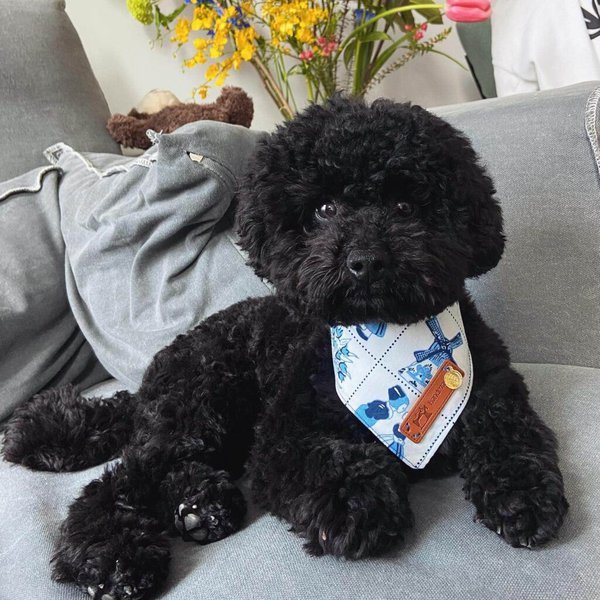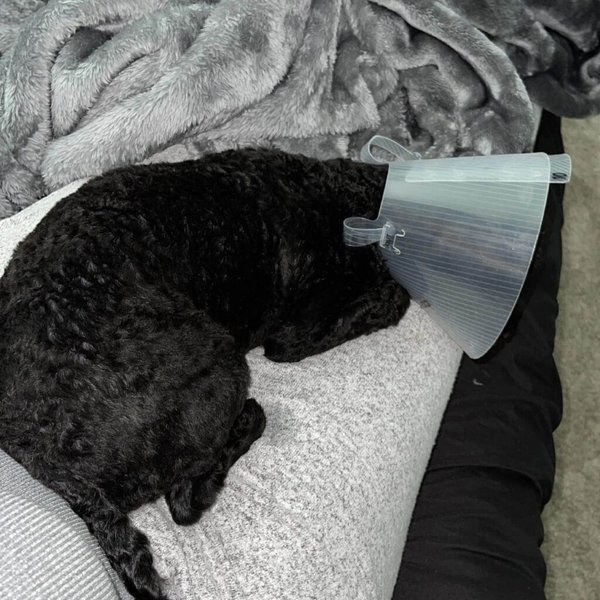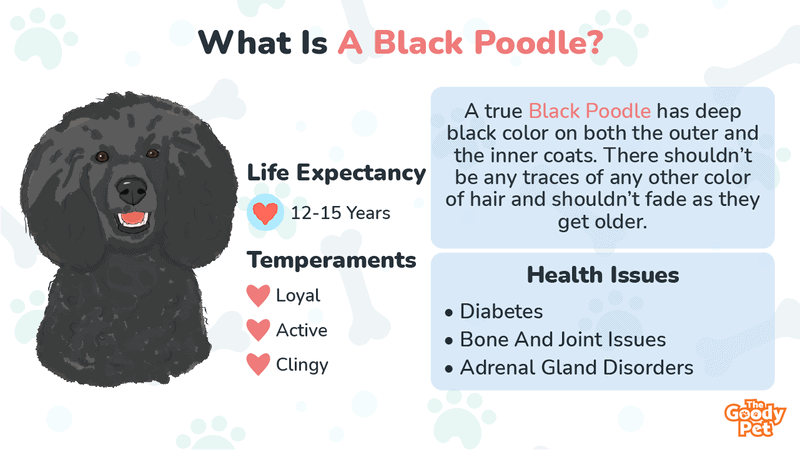Poodles are categorized as members of the non-sporting group. You see them in different sizes, from toy to standard size. Poodles come in different colors, too, including black.
How did the Black Poodle get its name? There’s a reason why a Poodle sounds like a puddle. It’s because Poodles were bred as water retrievers, trained to hunt ducks in the water. Poodles wouldn’t be relegated to such a challenging task if not for their innate high level of intelligence. Are all Poodles intelligent? Yes, Poodles, regardless of size and color, are among the most intelligent dog breeds.
In this post, you will get to know more about the breed, for example, if their intelligence causes stubborn behaviors. Also, we will share issues like proper care, health problems, lifespan, grooming, and shedding. It would also be interesting to know which Poodle color is the rarest. But for now, let’s focus your attention on the origin of a Black Poodle.
Can Poodles Be Black?
Why Are There Different Colors Of Poodles?
Genes are the reasons why Poodles come in different colors. At its simplest, a Poodle gets two color genes, one from each parent. One is the dominant gene while the other is the recessive gene.
The two color genes from the parents may or may not be the same, but it is the dominant gene color that will ultimately dictate what color the puppies will be. In the case of the Black Poodles, even if one parent is color white but since the dominant gene is black, then the puppies would be color black.
How Black Is Black?
All Poodles have outer and inner coats. A true Black Poodle has deep black color on both the outer and the inner coats. There shouldn’t be any traces of blue, silver, or any other color of hair, and neither should the black color fade as they get older. The skin of a Black Poodle is also colored black.
A Poodle that is Black is recognized by AKC. In addition to the standards of AKC, a Black Poodle must also have a black nose, lips, and eye rims. Both the eyes and toenails should also be black in color.
Color Changes
Can Black Poodles change color? Yes, because these poodle puppies are not considered true blacks. Some puppies are born with black coats, but as they age, the color black fades, usually within 1 to 2 years. Some may fade from black to blue, while some may fade into silver or gray.
The reason behind this is the loss of pigmentation or clearing.

How Long Do Black Poodles Live?
Lifespan
The expected life expectancy is between 12 and 15 years. Take note that size does matter, as smaller Black Poodles (toy and miniature) tend to live longer than the standard Black Poodle.
On average, the smaller ones can live up to 15 years while the standard Poodle has an average lifespan of 12 years.
Aside from size, there are other health issues that impact the lifespan of your furry companion, such as genetic health predisposition.
Diabetes
This disease is not uncommon among all dog breeds, but the Poodle breed is the one with the highest record. In this case, your pooch needs insulin injections to stay healthy. The signs are increased water intake and urination, and weight loss.
Bone And Joint Issues
What’s wrong with Black Poodles? The breed is genetically predisposed to hip and elbow dysplasia. This is a condition wherein the joints fail to develop properly and result in arthritis. The common signs are lameness and difficulty getting up from bed. If your dog suffers from a severe case, surgery is a good option.
Adrenal Gland Disorders
Black Poodles are susceptible to either Addison’s disease (low levels of the adrenal hormone) or to Cushing’s disease (high levels of adrenal hormone).
Do Black Poodles Smell?
Though dogs have that unique smell in them but in the case of a Black Poodle, the smell is not offensive. If you smell something bad, that is not normal for your pooch. The reasons could be any of the following: skin or ear infection, and fluid in the anal gland.

How To Take Care Of Black Poodles?
Diet
Since Poodle is an active breed, food that is rich in protein is essential. A high-quality dog food that is devoid of fillers will keep your pooch living healthy and looking good. Check the label if it states ‘complete diet.’ This guarantees you that the food has been tested and passed the qualifications set by AAFCO.
You can choose between dry or wet dog food. One of the top-of-the-line wet dog food is the Pet Plate. The ingredients are carefully selected and are in a human-grade category. Occasional treats are good as long as they are made with organic and human-grade ingredients.
Multivitamins can be given to your Black Poodle. These provide your pooch with additional nutrients like fatty acids to keep your Black Poodle healthier, and, hopefully, reach its maximum lifespan.
Dental Health
By the age of two, your pooch will begin to show signs of dental problems like tartar buildup. Do not take this for granted because a seemingly harmless tooth and gum discomfort can result in tooth loss and even infections.
One way to keep your pooch’s dental health at its optimum is to invest in dental water additives. These additives kill bacteria, reduce the formation of plaque and tartar, and keep your Black Poodle’s breath smelling nice and clean.
Exercise
An active lifestyle plays a huge role in the health of your pooch. Some of the benefits of exercise are boosted circulation to prevent heart disease, improved muscle tone, and the prevention of diabetes..
How much exercise is safe? If what you have is a Toy Black Poodle, 25 minutes is ideal. For the miniature, about 30 to 40 minutes, while for the Standard Black Poodle is 40 minutes to an hour.
Are Black Poodles Aggressive? Temperaments Of Black Poodles
Temperament
Poodles are known to be loyal, active, alert, and trainable. They also have the tendency to form a special bond with family members and get clingy, too. They wouldn’t be called ‘velcro’ dog breeds for nothing.
In case you fail to train your pooch on how to deal with separation anxiety, expect your Black Poodle to howl, bark, and do unwanted behaviors like peeing inside your home.
Poodles have the tendency to be territorial, too. Thus, these dogs can act out if they see unfamiliar faces. Yes, they are affectionate, but it takes time for Black Poodles to warm up to new people.
Are Black Poodles Good With Kids?
If you have kids at home, it is best to care for a standard-sized Black Poodle. They are more tolerant and gentle with kids.
On the other hand, both the miniature and the toy Poodles are high-strung. Yes, these smaller dogs are friendly to children, but due to their small sizes, children may inadvertently hurt them. If this happens, dogs may act defensively and may nip the children.
Are Black Poodles Stubborn?
Yes, if Black Poodles are not properly socialized and trained at a young age, they can exhibit stubborn behaviors. Remember that Poodles are very intelligent, and they have a mind of their own.
The problem is, at times, Black Poodles think that they are in charge and begin to act like the ‘boss.’ This kind of thinking leads to stubborn and destructive behaviors.
But, with constant mental and physical stimulation, you’d successfully curb the aggressive tendencies.

Do Black Poodles Shed At All? Grooming Tips For Black Poodles
Do Black Poodles Shed?
Black Poodles are very low shedders. Their fur does not shed off from their bodies but rather gets tangled. This can result in heavy matting if not cared for.
As a dog owner, you should groom your Black Poodle regularly, and the best way to do that is to use a reliable brush like FURminator Undercoat Tool. This effectively removes loose hair and prevents mattings.
Are Black Poodles hypoallergenic? Since Black Poodles are low shedders, yes, they are.
The second reason why Black Poodles are hypoallergenic is that they do not drool. A dog’s saliva causes allergic reactions in sensitive individuals.
Lastly, the third reason why Black Poodles are hypoallergenic is that they produce low dander.
How To Groom A Black Poodle?
How often should you bathe your Black Poodle? Bathe your beloved pooch once every 2 weeks. Here are the easy steps:
- Brush the coat before bathing to remove dirt.
- Using lukewarm water, carefully wet the entire body.
- Use a shampoo and conditioner that are made for dogs. These are gentle and won’t irritate your Black Poodle’s skin. A good recommendation is the Mighty Petz 2-In-1 Oatmeal Dog Shampoo And Conditioner. This is made with natural ingredients, so you are assured of its safety.
- Rinse-off.
- Pat-dry your pooch and then wipe the inside of the ears. Poodles have long ears making them more susceptible to ear infections.
What about professional grooming, how often should Black Poodles be groomed? To prevent heavy matting, you can take your Black Poodle to a professional groomer once every 6 weeks.
Other Grooming Tips
The nails of your Black Poodle grow fast, so trimming must be done every 3 to 4 weeks. The problem with having black nails is that the quick is hard to locate. My tip is to just cut the uppermost tip to prevent bleeding.
Related Questions
What Are Black Points On A Poodle? Black points are pigmentations or darker colors on the lips, paw pads, toenails, eye rims, nose, and tongue. In the case of a Black Poodle, the black points will always be black. The same is true for the gray and the silver Poodles. Most of the time, the appearance of black points is harmless.
Why Is My Poodles Skin Turning Black? It’s completely natural for a Poodle’s skin to turn black over a period of time. There are three main causes to note, namely, prolonged sun exposure, dark spots or aging, and hyperpigmentation. These causes shouldn’t alarm you. You should only worry if skin darkening comes with a bad smell, intense itching, and the presence of skin masses.
What Is The Rarest Color Of A Poodle? The Apricot Poodle is the rarest. This is due to the recessive nature of the apricot gene in all Poodles, thus, making it difficult to produce Apricot Poodles. These rare poodles are the result of breeding Red Poodles, which are also uncommon, making the Apricot Poodles even more complex to breed.





